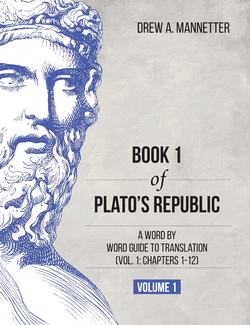Читать книгу Book 1 of Plato's Republic - Drew A. Mannetter - Страница 5
На сайте Литреса книга снята с продажи.
ОглавлениеTABLE OF CONTENTS
Introduction
Author’s Note on Using this Text
Notes on the Text
PART I: (327.a-336.a)
Numerous friends gather at Cephalus’ house for an evening of promised discussion. Socrates quickly turns the topic of conversation from old age to the question “what is justice?”. Three common sense definitions of the word justice are advanced but Socrates exposes weaknesses in each and they are all ultimately rejected.
I.1: (327.a-328.b)
Friends meet during the festival.
I.1.A: (327.a-328.b.)
After witnessing a festival at the Piraeus, Socrates and Glaucon are returning to the main city of Athens when Polemarchus and other friends invite them to a gathering at the home of Cephalus, Polemarchus’ father.
I.2: (328.b-331.b)
The discussion between Socrates and Cephalus on old age and wealth.
I.2.A: (328.b-328.d)
Socrates and Glaucon fall in with Polemarchus and his friends and arrive at Cephalus’ house. Cephalus, who had been sacrificing in the courtyard, greets Socrates kindly.
I.2.B: (328.d-329.d)
Socrates and Cephalus discuss the positive and negative aspects of old age.
I.2.C: (329.d-331.b)
Socrates questions Cephalus on the advantages of wealth for the elderly. Cephalus maintains that it is easier to live a just life with wealth and to have a free conscience by not having to neglect sacrifices to the gods or doing wrong to humans.
I.3: (331.b-336.a)
The first three definitions (and their modified forms) of justice are proposed and subsequently rejected.
I.3.A: (331.b-331.d)
Here begins the central argument of Book 1: what is justice? Socrates summarizes Cephalus’ ideas on the usefulness of wealth as the first definition of justice: “truth-telling and paying back what one has received from anyone”. Socrates quickly problematizes this definition, and Cephalus turns the argument over to his son Polemarchus and departs.
I.3.B: (331.e-332.a)
Polemarchus advances the second, poetic, definition of justice based on the poet Simonides: “giving back what is owed to each”. This definition is also rejected as inadequate.
I.3.C: (332.a-332.c)
The second definition of justice is altered to form the third definition: “to benefit friends and harm enemies”, a very common definition in ancient Greek thinking.
I.3.C.1: (332.c-332.e)
The first reductio ad absurdum argument against the third definition of justice demonstrates that justice is only useful in war.
I.3.C.2: (332.e-333.e)
The second reductio ad absurdum against the third definition of justice demonstrates that justice is useful in peace only when it is not used.
I.3.C.3: (333.e-334.b)
The third reductio ad absurdum against the third definition of justice demonstrates that justice is a kind of stealing which benefits friends and harms enemies. Polemarchus is reduced to perplexity, a well-known feature of the Socratic dialogues.
I.3.D: (334.b-334.e)
Polemarchus again reasserts the third definition, that “justice is to benefit friends and harm enemies.” Socrates refutes this definition again by showing the negative consequences of the fact that sometimes friends seem like enemies but are not and enemies seem like friends, but are not.
I.3.E: (334.e-335.b)
Polemarchus modifies the third definition to qualify that the friend must actually be a good man and the enemy actually be a bad man.
I.3.E.1: (335.b-335.e)
The modified third definition also proves to be false as the just man will harm no one, either friend or enemy.
I.3.F: (335.e-336.a)
The definition, that it is just to help friends and harm enemies, is totally rejected in all its forms.
PART II: (336.b-339.b)
The Sophist Thrasymachus enters the debate. He is upset by what he considers the naiveté of the discussion and admonishes Socrates accordingly. After feigned reluctance, Thrasymachus presents his definition of justice: “justice is the interest of the stronger.” Socrates criticizes this definition with an equivocation on the term “the stronger.” Thrasymachus then clarifies that he is thinking specifically of political power, regardless of the system of government.
II.1: (336.b-338.c)
Thrasymachus joins the discussion and chides Socrates for not answering the question himself. He demands that Socrates propose a definition but places restrictions on the terms he will allow Socrates to use in his definition. Finally, Thrasymachus offers to provide what he considers a better definition of justice. As a Sophist who is paid to teach, he demands payment of money. Socrates agrees to pay the price of learning from one who knows. The assembled company urges Thrasymachus on by promising payment.
II.2: (338.c-338.d)
Thrasymachus proclaims his definition of justice: “justice is nothing other than the interest of the stronger”. Socrates begins to problematize the definition by equivocating on the term τοῦ κρϵίττονος. Socrates interprets this as a masculine form meaning “the stronger man” while Thrasymachus intends it to be neuter meaning “the stronger party”. Since the forms are identical, Socrates is able to show the silly ramifications if the term is masculine. The equivocation serves to irritates Thrasymachus.
II.3: (338.d-339.b)
Thrasymachus makes clear that he is not speaking of a physically strong man when he speaks of the stronger but the political elite, regardless of the form of government.
